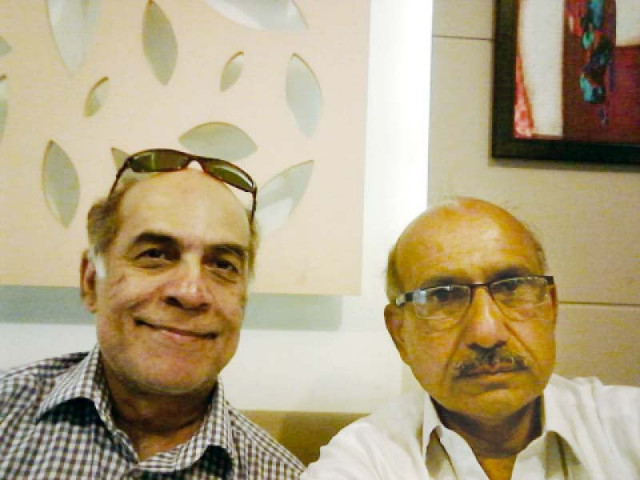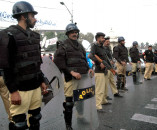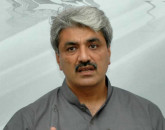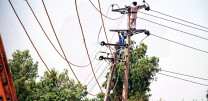the Poet of Multan
Riffat Abbas has created a new genre in Seraiki poetry. One can call it political fable

THE AUTHOR AND THE POET
Being part of the prevalent cyber-activism, I translated and published online Riffat’s poem, Haathi. It was about an elephant reared by town fathers to perform certain tasks. Over time, the beast becomes more powerful and starts terrorising his masters. A tailor takes on this behemoth that is turning into a tank. The tailor disappears, but not without causing a small setback to the elephant.
This is quintessential Riffat Abbas. He has created a new genre in the Seraiki poetry which one can call a political fable. In a society where repression is the norm and careless words can be fatal, this is an effective strategy.
Sangat Ved (The Gospel of Companionship) is a book of going back to one’s roots. How far back can you go, if you have been invaded, conquered, colonised, enslaved, cleansed and transformed for thousands of years? Do you still have an identity? Riffat resorts to the Aryan mythology and invokes the gods, prayers, and symbols of Rig Veda. The many upheavals that the ancient city of Multan has seen, such as the Forty Day Massacre by Muhammad Tughlaq, is seared onto his soul. The Sangat Ved becomes the fifth holy book. The Rig Veda, (one of the four ancient Vedas), was the Aryan book of hymns, composed between 1300 and 500 BC. The Aryan gods Indra (the god of rain), Vayu (the god of wind), Surya (the sun god) and Soma (the moon god) are protagonists in his poems.

Then, there are common people which include Mohran, the dancing girl of legend, stoned to death with her lover for refusing to extinguish the guiding lamp in her window.
Multan is subdued, but never defeated. With little hands, small people make clouds which bring them rain. There are things which are more important than statecraft. They include wild pigeons, which must be fed by the poet, the trees in the forest, which are his friends, tied and bound by the enemy; they must be married off. The Indus dolphin, the princess turned mermaid, which has a place in his heart that no woman can take, however beguiling her charms.
The Vedic gods have been tamed. They have lost their imperiousness. They have been reduced to appearing in toothpaste ads, working in banks and taking cameo roles in theatre. This is the triumph of the native over the alien; of the immanent over the contingent; of Seraiki over Punjabi.
His poems are astonishing, kaleidoscopic visions. They emerge as fully formed dream sequences, in bright and radiant colours; the kind of visions that make you stand in your tracks, struck with awe. They are psychedelic though not hallucinatory. They provide comfort even when they talk about misery; hope, when they bewail persecution. The magic he weaves will have you spellbound. The sensuous imagery will make your spine tingle.
In Ishq Allah Sain Jagya and Mukh Adam da, Riffat writes about God and His creation. Very quickly, the barriers come down and the distinction is lost. The doors and locks that are meant to keep the people out, mingle with townsfolk and play hide and seek. Allah is not in heavens, awaiting the mullah’s good offices to sponsor you. He is the succulent red guava, the honey bee hovering from flower to flower, the ant carrying the speck of flour, the sweet water that slakes your thirst, the dawn that turns into a crimson cow which feeds you directly from the teat. It is about the love of God and the God of love. It is the love of the shepherd for the Almighty, which annoyed Moses who in turn received a reprimand from Allah. (“Do you come to join together or do you come to tear asunder”?)
At Samma Satta railway station
I came across Allah Sain Himself
I sat down having a loaf of bread
He filled a bowl full of water
And brought it to me
He said “Allah Diwaya are you well?”
I saw Him and laughed
He saw me and laughed
Today, Bhiravan asks me
Come on, tell me what He is like?
Is He like you or like me?
Riffat is always impish, playful and irreverent, but never uncivil or impolite. He is irrepressible, with a twinkle in his eye, a bit like the cartoon in some of his poems. The cartoon is a symbol of resistance. It can be flattened, thrown from the city walls, paraded over by a whole army and broken into pieces, but will then get up and be whole again. Its eyes, nose and ears may be put back in the wrong place, but it does not matter, because it never dies. Riffat has an unrivalled wit. He is deadpan, even when you fall about laughing.
He has an ear for music; he is close to the music legend, Surayya Multanikar. The metres he uses are the native South Asian ones, not the Arabic metres which are standard for Persian and Urdu. He is well read in the regional Indian and Pakistani poetry. He also counts among his influences Neruda, Whitman, Paz and Baudelaire. He is an avid reader of the Karachi magazine, Aaj, published by that lone voice of sanity, Ajmal Kamal. It provides him with a window to the world of international literature.
He is rooted in the classical Seraiki tradition, as far as the idiom and the language are concerned, but his sensibility and the treatment of subject matter is entirely modern. Both in terms of style and content, he is part of the tradition, yet he is able to surpass and transcend it. A bit like Faiz and Iqbal, he brings an epochal and transformative change to his poetic heritage. Unlike them, though, he is not a revolutionary. He is too confident of the strength of his history for that. He knows it will survive and prosper. Time is on his side.
Probharay Hik Shehr Ichoon is the message from a remote city. One day, the door in the citadel starts to dream. It reaches out, opens itself and sets off, to have a look inside the city. It ignores the spiral staircase, descending into the depths of the earth; where, at the head of an army of giant ants, is a blind commander wearing military decorations; where the control room has the clocks and telephones made out of heavy, oppressive, suffocation. The door finds the clocks from the city towers come down and play in the streets, when the city dwellers sleep under the full moon, oblivious to the time that stands still.
This is Multan, the timeless city. Go and see it. It has many charms, but if you want one reason to go, it is Riffat Abbas – Allah’s own poet.
Follow the author on Twitter, HakimHazik@Twitter.com
Some of the Books by Riffat Abbas: Bhondi Bhoin Te, Publishers: Book Ocean Multan Cantt. Sangat Ved, Beacon Books, Gulgasht, Multan Ishq Allah Sain Jagya, Kitab Nagar, Multan Cantt.
Published in The Express Tribune, July 17th, 2016.



















COMMENTS
Comments are moderated and generally will be posted if they are on-topic and not abusive.
For more information, please see our Comments FAQ